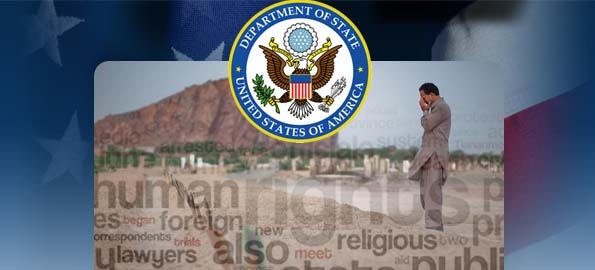The U.S. Department of State has released the annual Country Reports on Human Rights Practices for 2011, The report by U.S. Department of State is submitted to the U.S. Congress. This years report again highlights the plight of minorities including Ahmadis in Pakistan. The report makes the following statements about Ahmadis :
Disturbing trends include an increase in anti-Semitism, and continued persecution of other religious minorities, including Ahmadis, Baha’is, Tibetan Buddhists, Christians, Jews, and others.
Minority prisoners generally were afforded poorer facilities than Muslims and often suffered violence at the hands of fellow inmates. Christian and Ahmadi communities claimed that their members were more likely to be abused in prison. The Center for Legal Aid and Assistance reported that conditions were often worse for those prisoners accused of violating the blasphemy laws.
Police often failed to protect members of religious minorities, including Christians, Ahmadis, and Shia Muslims, from attacks.
Laws prohibiting blasphemy continued to be used discriminatorily against Muslims, Christians, Ahmadis, and members of other religious groups. Lower courts often did not require adequate evidence in blasphemy cases, and some accused and convicted persons spent years in jail before higher courts eventually overturned their convictions or ordered them freed.
Censorship or Content Restriction: The few small, privately owned wire services and media organizations generally practiced self-censorship, especially in news reports involving the military. Private cable and satellite channels also practiced self-censorship at times. The government continued to restrict and censor some published material, while blasphemy and anti-Ahmadi laws restricted publication on certain topics.
Freedom of Assembly
Although the constitution provides for the freedom of assembly, in practice the government placed selective restrictions on it. By law district authorities can prevent gatherings of more than four persons without police authorization. The law permits the government to ban all kinds of rallies and processions, except funeral processions, for reasons of security.
Authorities generally prohibited Ahmadis from holding conferences or gatherings.
The government required voters to indicate their religion when registering to vote. In order to register to vote, the government required Ahmadis to declare themselves as non-Muslims. Ahmadis consider themselves Muslims, and as a result, the community was unable to vote.
Minority prisoners generally were afforded poorer facilities than Muslims and often suffered violence at the hands of fellow inmates. Christian and Ahmadi communities claimed that their members were more likely to be abused in prison. The Center for Legal Aid and Assistance reported that conditions were often worse for those prisoners accused of violating the blasphemy laws.
The full report can be found here.

